
Trademark Attorney
A registered trademark is critical in defending your name and reputation against copycats, squatters and imitators. But even in the beginning stages, before investing capital into promotional materials or establishing an internet presence, it is important to ensure that the trademark chosen will not need to be changed a short while later. Do not be tempted to do this yourself. Seek advice of our experienced trademark attorney at Kaplan Law Practice. LLC. Contact us today to request your initial case evaluation.
Joshua Kaplan, Esq., has built his trademark services from case study and real world experience. Let our client-recommended law firm guide you through the treacherous process of obtaining and maintaining a registration for your trademark.
*Note that because of the nature of the trademark law, our trademark practice extends beyond New York and New Jersey, to the other 48 states.
Trade Name Registrations
- A registration provides trade mark protection across all 50 states.
- A trademark can also be registered internationally. Please contact Kaplan Law Practice, LLC., to find out how.
Due Diligence Studies
- Do not go into business without researching existing use of a trade name or trade dress. It may end up costing you a lot more than just initial capital. Call us if you wish to register or purchase a domain name, or if you wish to import goods from abroad. Remember, not knowing about publicly accessible information is not a defense, so play it safe and contact the Trademark attorneys at Kaplan Law Practice, LLC.
Responses To Trademark Office Rejections
- Joshua Kaplan. Esq., at Kaplan Law Practice LLC., will guide your patent registration from inception to issuance. Although success is not guaranteed, a properly planned initial filing should avoid most prosecutorial pitfalls. However, if you have registered the mark on your own, or with another attorney, we will be more than happy to review your case and assist you in your efforts to procure registration for your mark.
Trademark Infringement Practice
- Cease and desist letters.
- Priming your case for litigation (Kaplan Law Practice, LLC will partner with litigation specialists should a need for a lawsuit arise)
Cybersquatting
Trademark lawyers know that cybersquatting is increasing at an alarming rate. Cybersquatting is what happens when another company uses a similar domain name to another company in an effort to redirect unaware consumers to malware prompts. Malware is a piece of software written specifically and with the intent to damage devices, steal data, and wreak havoc for consumers. Some of the different types of malware used for this purpose are ransomware, spyware, Trojans, and viruses. Malware not only causes damages to consumers but can also cause damage to the company whose domain they cybersquatted on.
What Is A Malware Prompt?
A malware prompt can take several different forms. Some prompts appear as Google Chrome browser extensions. Other prompts are pop-ups that claim to be a security check to verify that the user is not a bot. Another common prompt is one that claims the user needs to update their flash player. The list goes on and on. But these prompts all have one thing in common and that is to get the consumer to click on them and download software that will collect sensitive and private information stored on the consumer’s device or launch software that will damage the consumer’s computer.
Malware prompts are not just frustrating for the consumer that clicks on them, they are also legally actionable according to courts around the country. Both arbitrators and judges have deemed that cybersquatting and distributing malware is just bad faith intent.
If your company has been a victim of cybersquatting and your consumers have clicked on the malware prompt, this can cause much damage to your brand. There are steps that companies can take to help detect malware and steps that can protect you if this should happen. Talking to an experienced trademark lawyer can help you navigate these particularly complex situations.
Trademarks Infographic
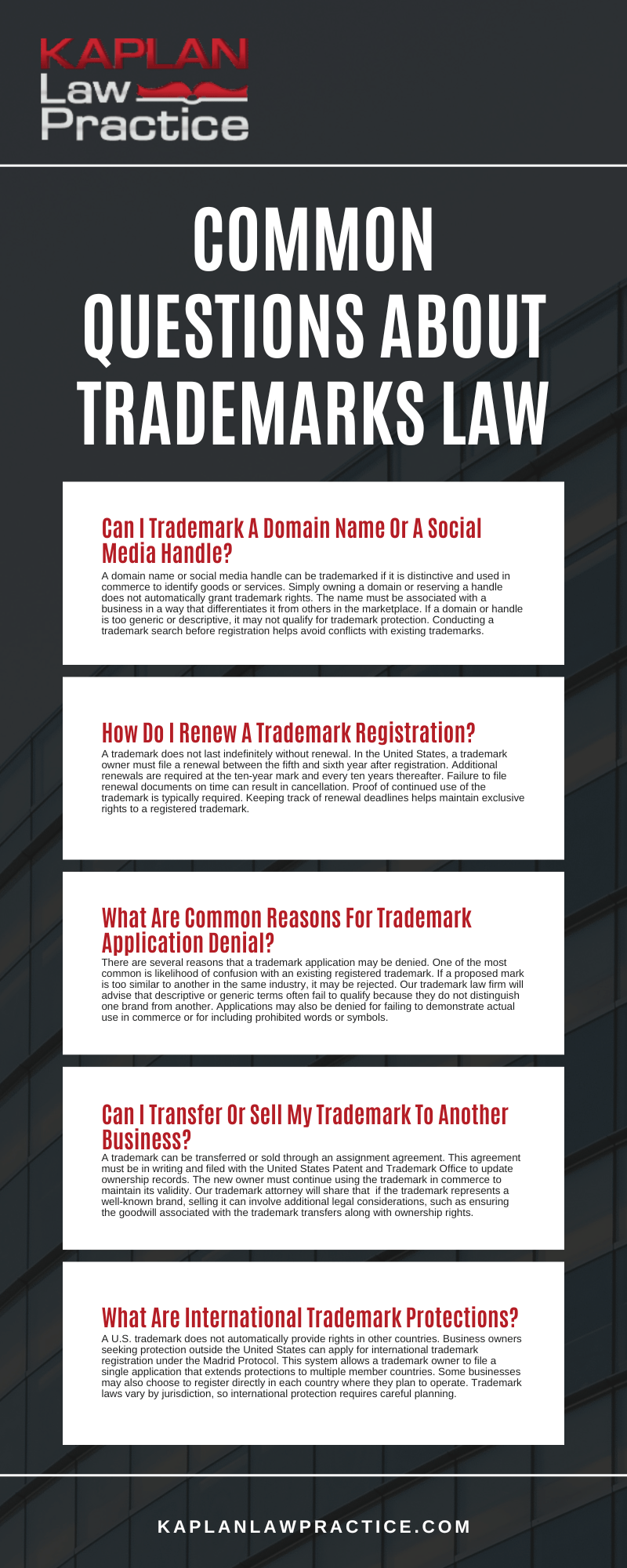
How To Detect Cybersquatting
Although some companies discover cybersquatting on their own, the majority of cybersquatting identification and malware discovery is done via professional monitoring efforts. When malware is discovered, your attorney can take the legal steps for enforcement. The first step your attorney will take is to send a cybersquatting demand letter to the domain name’s registrant, website host, or any other entity he or she can identify. Many domain registrars and hosting companies have stringent policies that prohibit trademark infringement and using domain names to launch malware. In most cases, the cybersquatter’s account will be deactivated.
There are several other legal options your trademark attorney has in order to stop the entity behind the cybersquatting. The Uniform Rapid Suspension System (URS) was introduced in 2013 and is used to go after domains that were created after 2012 and are generic top-level domains (gTLD). The URS allows a trademark owner to file a complaint and, if successful, get that domain name suspended.
The Uniform Domain Name Dispute Resolution Policy (UDRP) is the process an attorney can use to file a complaint against the bad domain owner relating to their bad faith use of the similar domain name. The third option is filing litigation under the Anticybersquatting Consumer Protection Act (ACPA) against the entity that owns the “bad” domain name. Call our experienced trademark lawyer from Kaplan Law Practice today so that you can protect yourself from cybersquatters.
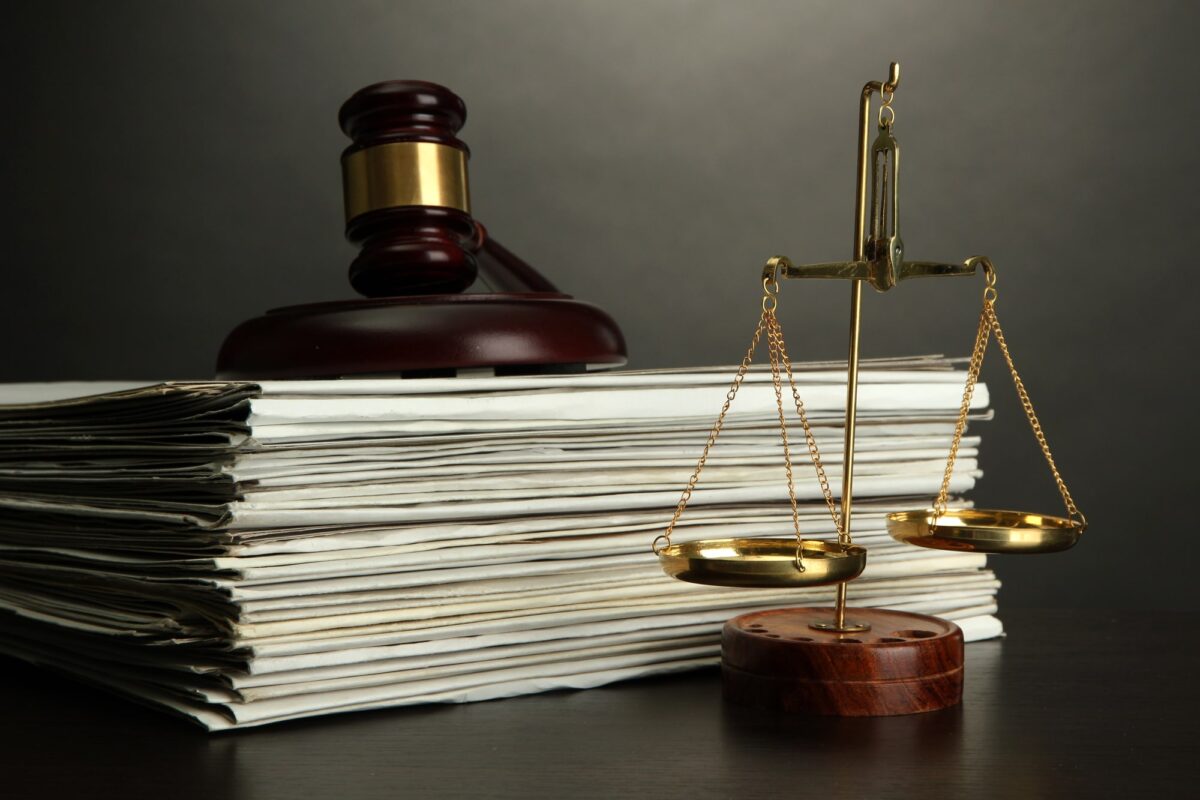
Trademarks Statistics
Trademarks are essential for distinguishing products and services in the marketplace, and their protection is critical for businesses and consumers alike. According to the United States Patent and Trademark Office (USPTO), in 2020, there were approximately 630,000 trademark applications filed in the United States, marking a steady increase in businesses seeking trademark protection for their intellectual property. This growth reflects the importance of branding and the need for companies to secure their unique identities in a competitive market.
Globally, trademark filings have also seen a rise. The World Intellectual Property Organization (WIPO) reported that in 2020, over 1.5 million trademark applications were filed worldwide, with China, the United States, and the European Union leading the way in terms of the number of filings. This increase is attributed to the growing importance of online businesses and e-commerce, where trademarks are vital for preventing confusion and protecting brand recognition.
The number of registered trademarks has been steadily increasing in various sectors, including technology, fashion, and food and beverages. The rise in trademark applications demonstrates the ongoing efforts by businesses to safeguard their brands and ensure consumer trust in an increasingly globalized and digital marketplace.
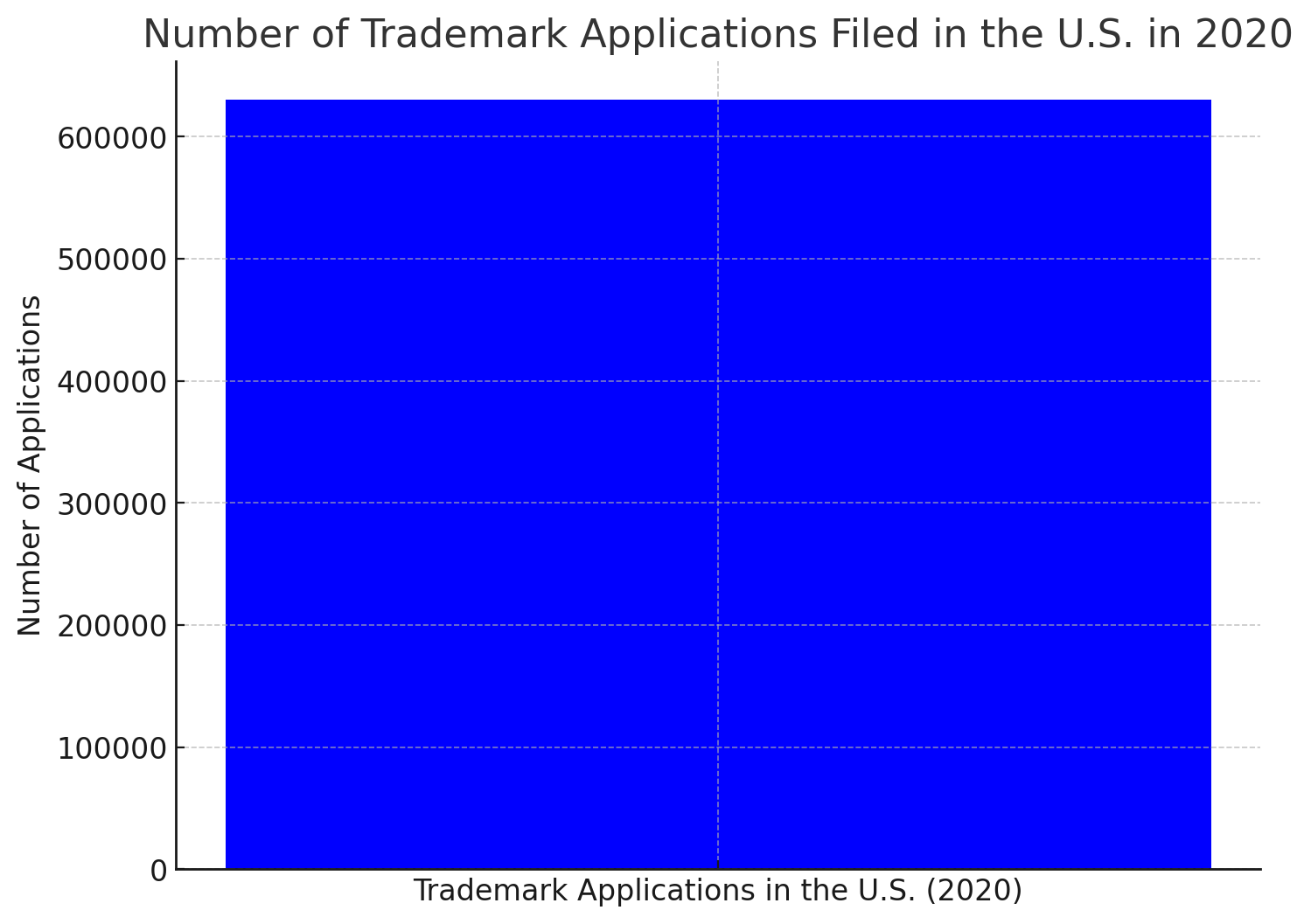
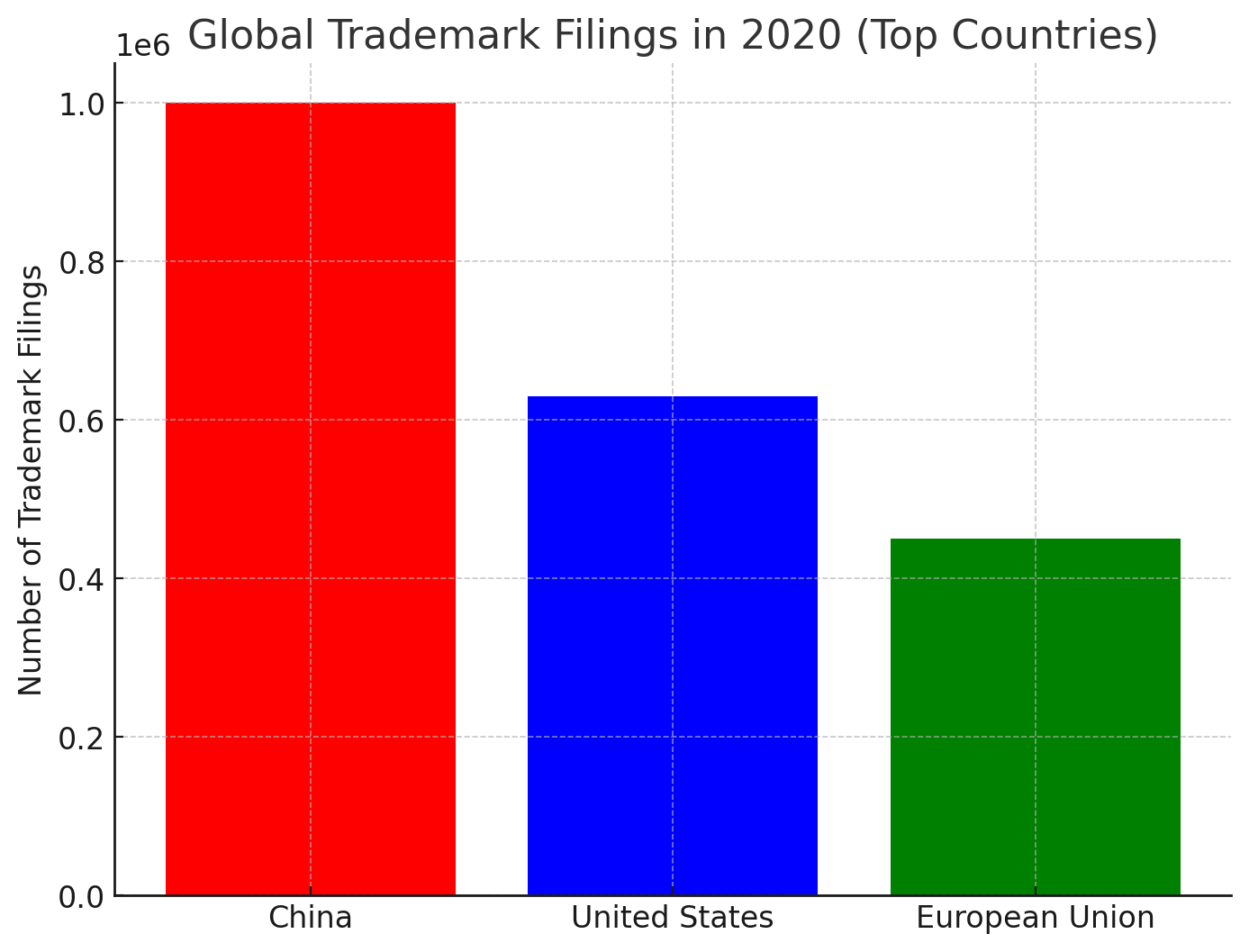
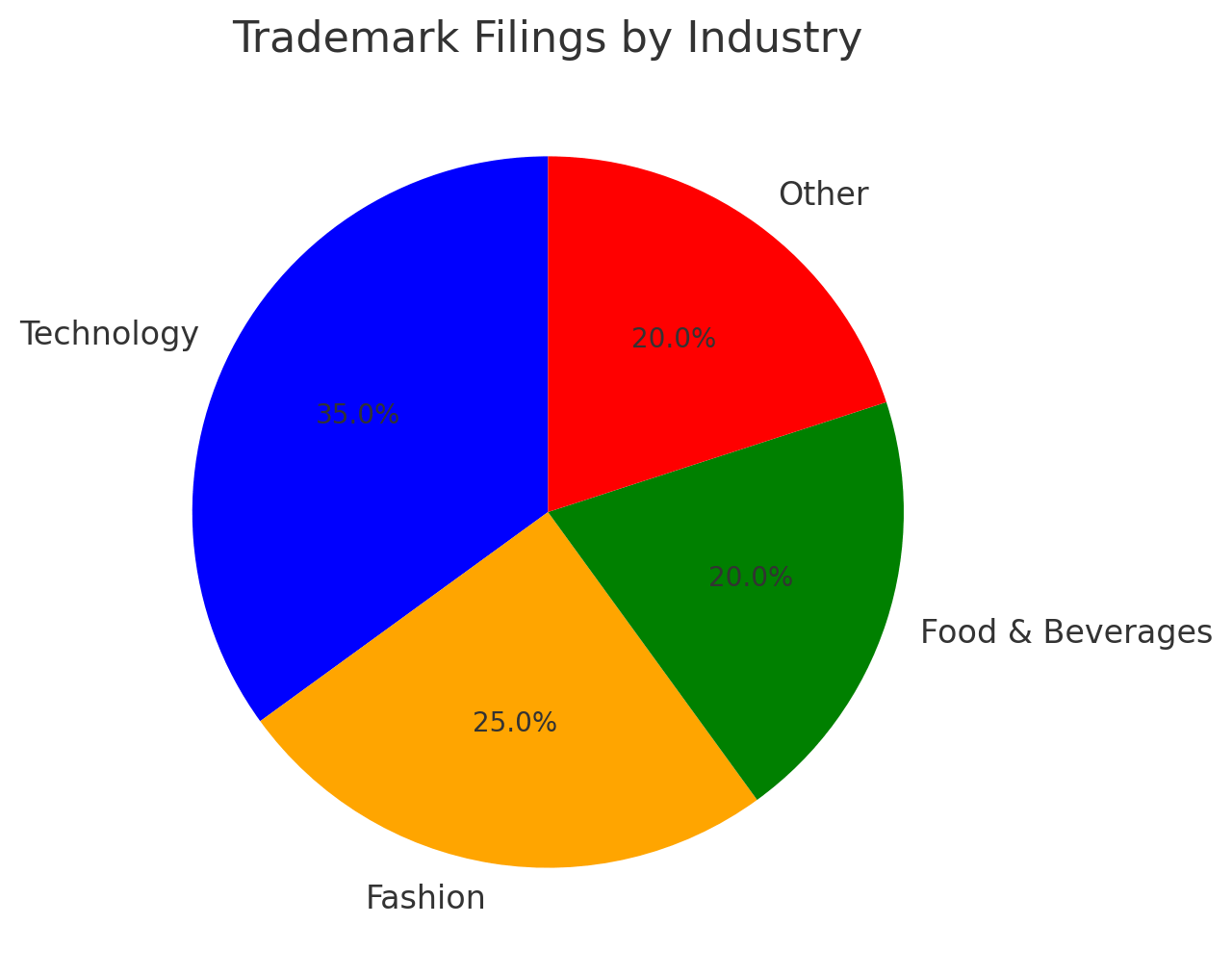
Answering Common Questions About Trademark Law
Securing a trademark is an important step for protecting a business’s brand, but many aspects of trademark law can be confusing. From registration and renewal to international protections, business owners often have questions about how trademarks apply to their specific needs. Below, our business trademark attorney will cover some of the most frequently asked questions to provide clarity on these topics. A trademarks lawyer can offer guidance on the legal considerations involved in the process.
Can I Trademark A Domain Name Or A Social Media Handle?
A domain name or social media handle can be trademarked if it is distinctive and used in commerce to identify goods or services. Simply owning a domain or reserving a handle does not automatically grant trademark rights. The name must be associated with a business in a way that differentiates it from others in the marketplace. If a domain or handle is too generic or descriptive, it may not qualify for trademark protection. Conducting a trademark search before registration helps avoid conflicts with existing trademarks.
How Do I Renew A Trademark Registration?
A trademark does not last indefinitely without renewal. In the United States, a trademark owner must file a renewal between the fifth and sixth year after registration. Additional renewals are required at the ten-year mark and every ten years thereafter. Failure to file renewal documents on time can result in cancellation. Proof of continued use of the trademark is typically required. Keeping track of renewal deadlines helps maintain exclusive rights to a registered trademark.
What Are Common Reasons For Trademark Application Denial?
There are several reasons that a trademark application may be denied. One of the most common is likelihood of confusion with an existing registered trademark. If a proposed mark is too similar to another in the same industry, it may be rejected. Our trademark law firm will advise that descriptive or generic terms often fail to qualify because they do not distinguish one brand from another. Applications may also be denied for failing to demonstrate actual use in commerce or for including prohibited words or symbols. A trademarks lawyer can assist in overcoming these challenges by ensuring an application meets legal requirements.
Can I Transfer Or Sell My Trademark To Another Business?
A trademark can be transferred or sold through an assignment agreement. This agreement must be in writing and filed with the United States Patent and Trademark Office to update ownership records. The new owner must continue using the trademark in commerce to maintain its validity. Our trademark attorney will share that if the trademark represents a well-known brand, selling it can involve additional legal considerations, such as ensuring the goodwill associated with the trademark transfers along with ownership rights.
What Are International Trademark Protections?
A U.S. trademark does not automatically provide rights in other countries. Business owners seeking protection outside the United States can apply for international trademark registration under the Madrid Protocol. This system allows a trademark owner to file a single application that extends protections to multiple member countries. Some businesses may also choose to register directly in each country where they plan to operate. Trademark laws vary by jurisdiction, so international protection requires careful planning.
Keep Your Trademark Secure Over Time
Ongoing attention is required for maintaining trademark rights. From renewals to ownership transfers and international registrations, business owners must actively protect their trademarks to prevent loss of rights or infringement by others. Taking proactive steps to monitor and enforce a trademark can help preserve its value. Our firm is available to support, offering our down to earth, personalized services. For assistance with trademark registration, renewal, or protection, Kaplan Law Practice, LLC provides legal support from our trademarks lawyer to help businesses safeguard their brands; we are licensed in New York and New Jersey.
